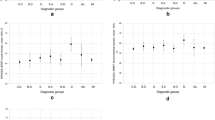Abstract.
Background: There have been few studies on the impact of de-institutionalization on psychiatric patients' lives in Chinese culture. The objectives of the present study were: (1) to compare quality of life (QOL) of Chinese patients with schizophrenia living in three different treatment settings (hospital, long-stay care home and half-way house) in Hong Kong, and (2) to identify factors associated with patients' subjective well-being. Method: A matched-group design was used. Subjects (n = 204) living in the three treatment settings were matched according to age, sex, educational level, marital status, length of psychiatric illness and number of previous psychiatric admissions. Multiple measures for the evaluation of QOL included the Satisfaction With Life Scale (SWLS), WHO Quality of Life Measure-Abbreviated version-Hong Kong (WHOQOL-BREF-HK), Life Event List (LEL) and the Global Assessment Scale (GAS). Psychiatric symptoms were evaluated with the Brief Psychiatric Rating Scale (BPRS). Results: Significant differences in objective QOL indices (global level of functioning, number of life events and income) between subjects staying in hospital and community-based residential services were found in favour of the less restrictive community settings. However, with respect to global life satisfaction, subjects preferred the more secure settings despite their restrictiveness. Predictors of subjective well-being were educational level, negative life events and the BPRS items of somatic concern, anxiety and guilt feelings. The impact of negative life events on subjective well-being decreased over time. Conclusion: In a cohort of Chinese patients with chronic schizophrenia, community-based treatment settings had a positive impact on objective QOL indices but not on subjective well-being. Negative life events, education level, and the BPRS items of somatic concern, anxiety and guilt feelings were predictors of subjective well-being which seemed to adapt to external circumstances over time.
Similar content being viewed by others
Author information
Authors and Affiliations
Additional information
Accepted: 1 October 2002
Correspondence to Dr. G. S. Ungvari
Rights and permissions
About this article
Cite this article
Chan, G., Ungvari, G., Shek, D. et al. Hospital and community-based care for patients with chronic schizophrenia in Hong Kong . Soc Psychiatry Psychiatr Epidemiol 38, 196–203 (2003). https://doi.org/10.1007/s00127-003-0616-5
Issue Date:
DOI: https://doi.org/10.1007/s00127-003-0616-5



